Wow. What an amazing book. I had read this book back in 2008 before I was married, or was even thinking about raising children, and it was an amazing read then. Now, I'm married and expecting a little one and it's even more amazing! I seriously took 13 pages of notes on it in my journal!!!! I know, a bit overboard, but it's one of those books that you gain so much wisdom and little tidbits from you just want to have them in one place where you can check often. This book has helped me rethink my priorities as a woman (I always feel old when I refer to myself as a woman, anyone else? no just me? ok...), using the Bible as a guide (which it should be for all things) and highlighting things I can do daily to live a fuller life in every area. I don't want to go into SOO much detail because I know people don't read long posts--but just come along with me for a bit...she relates our fullness in life to that of the Seven Sacred Pools in Hawaii (like a waterfall). This describes the huge impact we can have for our own life, but also in the lives of countless others when we get these things right. Let me try to explain the picture to you. There's a pool way at the top of the mountain, which no one can see, and that is like your relationship with God, your prayer life, your deep connection with Him and His Word. He fills us and replenishes us when we seek him first in our life and are filled with his Holy Spirit. When we are full from that pool we are overflowing into our next pool, our husbands. God gives us the ability to tend to nurture and grow in servitude to our most important human relationship. Soon this pool overflows to that of our children. Children are gifts to us from God and He entrusts them to our care to love them, to train them and teach them about his ways. Soon that pool too will overflow and flow abundantly into our homes and filling it with God's love. Whether it be by the spiritual life of your family, the feeding, and the love that you give to them to make a home a retreat and a beautiful place until it soon overflows into our dreams and plans and how God wants us to serve others. "Having been filled from the pools higher up the mountain, we now plunge in. WE submerge ourselves in this fresh pool of knowledge, discipline , and training" and soon that too overflows pouring into an ocean of ministry and service that God will use to build His people up--you never know where that pool may end or who it may reach because it has not limits. But you see the key is, that each pool can only be filled if the one above it is overflowing. Do we make is so that our hearts of overflowing for God, our husband, and our children, our home, and then into other areas of ministry? Do we take the time to nurture each of those priorities first and let God fill us to overflowing? I find that sometimes I think that the top pools don't need to be filled and I busy myself with the maybe not most important areas, even if it is a church event, or a ministry-but it doesn't prove to be helpful because the other pools aren't full. It's hard to serve my husband and have a good relationship with him when I don't have a good relationship with the Lord. There is a quote she uses often in the book and it this: "Good, better, best, never let it rest, until your good is better and your better best." You can apply that little childhood quote to soo many areas in your life, especially when making decisions, choosing your attitude, how you schedule your time etc. If you aren't married or don't have children you might not have these pools yet, but it's still crucial to understand your priories and fill up the time in your life from the top pool down.
There were so many amazing quotes and so many references to the Bible and other great books by numerous authors have really just made me LOVE this book. The book isn't just about the imagery of the pools, in fact thats only one section in a chapter! But I feel that it describes what she focuses on in the other chapters--devoting most of it to a woman after God's heart. It's one of those "back to the Bible basics" for woman, and can be applied to a woman anywhere in life--from young and single, to newly weds to wives of many years, to single moms, to working moms, to say at home moms, from biblical scholars to new in the faith. I hope you woman will pick it up and not just read it, but see how you can use it to grow and become a woman after God's own heart.
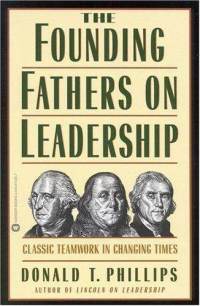 I love History and I love reading about Leadership. Why? I believe it the one of two most understudied and misunderstood things in our culture today--and both are major subjects lacking in our schools today. This book is an incredible example of teamwork and how people need to work together in order for their businesses, teams, organizations, or families to work together.
I love reading about our founding fathers and Phillips goes into so many details about the coming together of our nation. If you are lacking on your history knowledge a little bit, read this, it's also an amazing "refresher" for the learned historians as well. The book most specifically focuses on George Washington (he's so cool, really....I mean the guy is incredible!), Thomas Paine, Thomas Jefferson, James Madison, of course Benjamin Franklin, and many more. It focus' on how each individual leveraged different skills in leadership to help the country go from being a a big nobody (in Great Britain's eyes) to the United States of America. Imagine trying to convince a group of "people" they should declare independence from one of the greatest super powers in the world at that time, with one of the largest armies, and with one of the most advanced navies...just to name a few things, but that is what these men and many others did. America did not start out easy, nothing great ever does. The Revolutionary War was not easy, in fact we were losing most of the time, but because men like Washington led his troops valiantly and people like Thomas Paine renewed the moral of the culture and the troops, America pulled through.Then--just when you think we're all set and on the right track-- after winning the war, they had to deal with bankruptcy, the different states each wanting to be individual and not united, a failing Articles of Confederation, a bunch of angry regiments who weren't getting paid, and many many MANY more problems. America could have easily fallen apart after the revolution if not for the courage, determination, and leadership of our founding fathers. Think we could learn a bit from these guys?? I think so.
I know I did a horrible job of trying to explain my love of this book and the stories that are in it, but I would almost classify this as a must read for anyone seeking a position of leadership, whether that be in your family, in schools, at work, in church or through other organizations. We can't rise to a position of leadership and expect to know everything...people are well, they are people, and it takes a Leader to unite them and move them together in a common direction. This book is a great place to start! Enjoy! -Britt
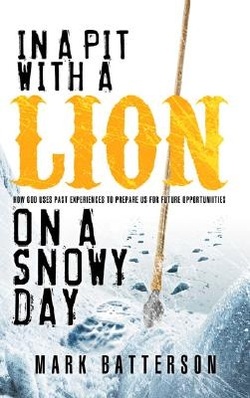 Have you ever come across the story in the Bible about Benaiah? I had never recalled hearing the name before and I didn't realize that what this guy did was probably one of the most courageous acts recorded in the Old Testament. Here's the passage: "Benaiah son of Jehoiada, a valiant fighter from Kabzeel, performed great exploits. He struck down Moab’s two mightiest warriors. He also went down into a pit on a snowy day and killed a lion. And he struck down a huge Egyptian. Although the Egyptian had a spear in his hand, Benaiah went against him with a club. He snatched the spear from the Egyptian’s hand and killed him with his own spear." 2 Samuel 23:20-21. So thats it. No big deal right? It's just one of those passages you read and forget about not putting much emphasis on any part. Well, Mark Batterson took hold of this small passage from scripture and created a book about overcoming risks, setting big goals, and chasing big dreams, not small ones, but "lion size" dreams. I tend to place God in a box thinking that there are some things he can do and some things he can't with my life but what this book showed me was that with God all things are possible and he WANTS them for us, more than we want them for ourselves.
Not everyone goes looking for lions to slay or scrounges around trying to grasp opportunities, but Benaiah did, and he was well rewarded for it (He became King David's personal Body Guard! How cool is that?!). He was a lion-chaser. Mark Batterson quickly became one of my favorite authors after reading this book, I think his style of writing is really easy for me to read, and humorous as well. It's full of biblical knowledge and shows how to apply principles from the bible to our lives. I could go on and on, but I'll just leave you with SOME of my favorite quotes from the book. (This is hard because there are soo many!) So if you end reading here, and you have a big dream, or a something thats been on the back burner for too long, read this book, and read the BIBLE, it will help you realize that there isn't time to waste putting great dreams on hold, your time is now! God Bless! -Britt
"How you think about God will determine who you become. You aren't just the byproduct of "nature" and "nurture." You are a byproduct of your God-picture. And that internal picture of God determines how you see everything else. Most of our problems are not circumstantial. Most of our problems are perceptual. Our biggest problems can be traced back to an inadequate understanding of who God is. Our problems seem really big because our God seems really small. In fact, we reduce God to the size of our biggest problem."
"Why is it that the church is known for what we're against that what we're for? Why does it seem like the church is always in a defensive posture? Maybe it's time for Christ followers to put on crash helmets and play offense."
"Lion chasers don't retreat. They attack. Lion chasers aren't reactors, they are creators. Lion chasers refuse to live their lives in a defensive posture. They are actively looking for ways to make a difference."
"We need to stop criticizing culture and start creating it."
"Part of spiritual maturity is caring less and less about what people think about you and more and more about what God thinks about you"
"We should stop asking God to get us out of difficult circumstances and start asking Him what He wants us to get out of those difficult circumstances."
"Worship is forgetting about what's wrong with you and remembering what's right with God."
"Faith is risky business...Maybe risk taking is at the heart of righteousness. Maybe righteousness has less to do with not doing anything wrong and more to do with doing things right. Righteousness is using our God-given gifts to their God-given potential. and that requires risk. Maybe our view of sanctification is too sanitized. Maybe our view of Christianity is too civilized. Maybe we need to reconsider what made our spiritual ancestors heroic."
I'll end with a quote that he quotes by Johann Wolfgang von Goethe, " Hell begins the day God grants you the vision to see all that you could have done, should have done, and would have done, but did not do."
I just finished the old classic Pilgrim's Progress. If you can get past the Old English style of writing, it is quite an interesting interpretation of the life of a Christian. It is written from a Puritan perspective with the tradition of being very strict. Bunyan's theology is quite sound from a Biblical perspective and is a great story generic enough to stand the test of time, with its focus on principles and truths that are as true now as they were at the beginning of time.
It was a good reminder for me that the path to follow Christ is narrow and how easy it is for many not to take that path or try and find their way off that path along the journey. For many that declare themselves Christians will not be admitted into the "Celestial City" because they did not put all their trust in Christ Jesus for their salvation. Even if they did good works, talked well, had lots of friends, or knew of God, they would still get into Heaven only by believing in the cleansing blood of Christ for their sins. The visual picture of this in the book is when the two main characters have to cross a river right before entering the Gates. The river was not very wide but it could be very deep. There was no way across except to walk. When they walked across the river, if they had complete faith that they could not do it alone but only through the support of Jesus Christ, the river was shallow and simple to wade through. However, for anyone that did not have 100% faith that Christ was sufficient for them, the bottom of the river was endless, they were washed away and gone forever.
There are countless lessons throughout the book, like the one above, when reflected upon my own life, I can be more conscious of the pitfalls that I do encounter on the path of following Christ. Even though this is a hard book to get into right away it is worth the read for the timeless principles and would make a great book to discuss for church groups. -Paul
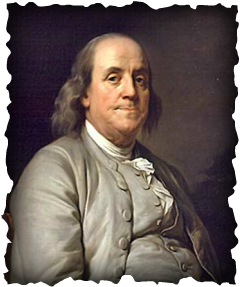
For anyone interested in the colonial period of American history, this autobiography is a fantastic read. The timeline of the book only goes from 1706 when Franklin was born until the end of the French and Indian War, which is a bummer since a lot of the most impactful things Franklin did in history occur after that time. The time that the book does highlight goes into detail to help the reader understand what Ben Franklin was really like. It is also a very well written book and entertaining to read. Franklin lead a really interesting life going from a boy of little means, to an apprentice, then an owner, and finally a statesman. Here are some of my highlights from the book.
Junto Club- This famous club that Franklin put together was responsible for the first public library, fire department, University of Pennsylvania and many other positive influences of colonial society. The club was a weekly gathering of influential people in the community where one member would write about an idea and all the members would discuss it. The book goes into great detail about how they set the club up and how they went about their discussions.
13 Virtues- Franklin's List of 13 Virtues is quite well known to people but the book tells the process he used to implement improvement in the 13 virtues. Franklin also tells how he came about making the list of the virtues and why he picked the ones he did.
Personal Growth- I was very impressed and encouraged by Franklin's hunger to always grow personally. It pays to read the book just on for this reason.
I would definitely recommend this book as it is a great window into what daily life was like during the colonial period. It also brings to life one of the most well known and influential men that helped to shaped America.-Paul
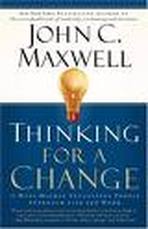 Are you a great thinker? Do you have scattered thinking like I do, or do you just not do much thinking for yourself? It's interesting to actually look back on a day or week and see how little thinking I actually did, especially intentionally. This book is a great interactive study on thinking. One thing that hit me at the beginning of the book was not even that I don't think but that I don't do enough thinking about things that will make progress, as Maxwell said "successful people focus their thinking on progress while unsuccessful people focus their thinking on survival or at best maintenance." Another quote I really liked of his was, "If you want to live on a new level, you need to think on a new level." How often do we strive to get better and move up to the next level in anything, but yet not have a care about moving our thinking to that level? Something that I agree with Maxwell on is the importance of having special places to go off by yourself do think, reflect and meditate, without distractions. I find for myself that early in the morning in my office or in the summer out on a deck or by a lake I seem to think the most clearly. I challenge you to find your "thinking spot" and certain time of day that you can set aside to think. What do you think about? Well here are the 11 Thinking Skills Maxwell goes through in the book. - Big Picture Thinking
- Focused Thinking
- Creative Thinking
- Realistic Thinking
- Strategic Thinking
- Possibility Thinking
- Reflective Thinking
- Questioning Acceptance of Popular Thinking
- Shared Thinking
- Unselfish Thinking
- Bottom-Line Thinking
To learn more about the thinking skills I listed, I would recommend that you read the book. I know that understanding these skills has helped me bring my scattered thinking into focus a little bit more. I hope that this book can help you be more intentional about your thinking, or at least get you to think! -Paul
Not, going to lie, this book took me FOREVER to read. NOT because it was boring, I think I just needed to take the time to go through it so that everything would digest properly!! There was so many good nuggets in this book, I wish I could go through them all, (So that I can remind myself what I read!!!) but I won't, you really will just have to read this book. Another awesome part about this book was that in about EVERY paragraph there was a reference to scripture. I never knew there was so many passages that related to our words and how we treat others.
Are you like me, do you find yourself rambling on with words in a conversation and then all of the sudden, you find yourself bitting your tongue, praying that what you just said, you really didn't say? Are you sometimes prone to gossip? To lie? To exaggerate? to murmur? to anger? to boast? to flatter? to swear? to be sarcastic? As this book says, our culture, especially Christians need a transformation of our tongue! Stowell says that it should be a top priority for those committed to spiritual growth. WOW, really? I honestly never really thought about things I say having an effect on my relationship with God, let alone my spiritual growth. But it truly does. Like Jesus said in Matthew 15 :17-19, "Don't you see that whatever enters the mouth goes into the stomach and then out of the body? But the things that come out of a person's mouth come from the heart, and these defile them. For out of the heart come evil thoughts--murder, adultery, sexual immorality, theft, false testimony, slander. These are what defile a person." If I am to have the Holy Spirit living in my heart, yet I have these things that defile me coming out of it, then do I truly have the Holy Sprit within me? (just a question to think on) Now, I understand no one is perfect, but I can't stop thinking of how much the things I do reflect upon my relationship with God and how in tune I am with the Holy Spirit. I know that I have the Holy Spirit within me, yet sometimes I feel I place him in a jar, screw the lid on top really tight so I can "say my few words" and in doing so I'm refusing to let Christ do his full work in me. Are my words, attitudes, actions always a reflection of the Holy Sprit in my heart? (I'll answer that for myself....no, they aren't) Anyway, I just babbled on again, sorry, it's just a really great book that made me think a lot about the life I live, and the life I should be living. Feel free to comment or question what I just wrote, especially if you've read the book, I love to hear other's thoughts. I'll post a few quotes from the book below just to spark your interest...Enjoy!
--We tend to tolerate a bit of "fire" in our speech, thinking it can do no harm. But fire spreads quickly--often before we realize it. And after a raging fire has done it's damage, it doesn't matter whether or not it was intentional. (p.18)
--We need to pray for wisdom in our speech (James 1:5). We should train ourselves to search for the truth in every situation. (p.32)
--Rumors, whether true or false, are devastating for many reasons--one being that they are irretrievable. I recall the story of a young man during the middle ages who went to a monk and said, "I've sinned by telling slanderous tales about someone. What should I do?" The monk replied, "put a feather on every doorstep in town." The young man did just that. He then returned to the monk, wondering if there was anything else he should do. "Go back and pick up all those feathers," the monk told him. The young man replied excitedly, "Thats impossible! By now the wind will have blown them all over town!" Said the monk, "So have your slanderous words become impossible to retrieve." (p.36)
--Galatians 5:13-15 "You were called to freedom, brethren; only do not turn your freedom into an opportunity for the flesh, but through love serve one another. For the whole Law is fulfilled in one word, in the statement, 'You shall love your neighbor as yourself.' But if you bite and devour one another, take care that you are not consumed by one another"
--Exaggeration erodes trust and credibility, two building blocks of successful relationships. It is a violation of God's will for us. (p. 55)
--Perhaps that the root of our problem [taking the Lord's name in vain]--we don't appreciate the real value of God's name. too often we interpret God from our limited point of view instead of conforming our thoughts to who God says He is. Our shortsighted perceptions of God insult Him by attempting to bring Him down to our level. the result is distorted thinking and idolatry. (p.68)
--(I'll end it here I promise!) All talk is really heart talk. Granted some people's spoken thoughts never seem to reach down to the heart (or up to the brain for that matter). But even empty flattery, thoughtless comments, automatic responses and mindless greetings are reflections of an insincere heart. Christ recognized that all talk is heart talk He said: Either make the tree good its fruit good, or make the tree bad and its fruit bad; for the tree is known by its fruit. You brood of vipers, how can you, being evil, speak what is good? For the mouth speaks out of that which fills the heart. The good man brings out of his good treasure what is good; and the evil man brings out of his evil treasure what is evil. But I tell you that every careless word that people speak, they shall give and accounting for it in the day of judgment. For by your words you will be justified and by your words you will be condemned. (Matthew 12:33-37) (p.77)
Betcha didn't think you'd be reading most of the book! LOL, sorry, but there was so many more verses, many more quotes that were so meaningful and helpful to myself, please read it for yourself, then tell me what you thought! Love to you all! Britt
 This is a great book that gives explains the theory side of leadership in easy to understand concepts while also showing how those theories have been put into action by people in real situations throughout history. I will just hit on the two concepts that struck me the most.
Three traits that someone needs to enter into leadership:
Hunger: Must have a willingness and eagerness to learn and grow
Honeable: Must be willing to be taught and seek counsel from those that have results
Honorable: Must maintain and grow good character, have things in the right prespective, and have an attitude to serve not to be served.
And then there are the three qualities to measure ones leadership ability:
Character: The more trustworthy and the more courage to do what is right, one possess the higher their level of leadership.
Task: Based on ability in their field, how hard they work, how smart they are about how they work, and are they willing to do any task, no matter how small.
Relationships: Based on how good they are at building and maintaining strong relationships, how good they are at resolving issues in relationships.
I would recommend this book to anyone that wants to lead in any field of life. Just going into detail on the two concepts I wrote about will change how one looks at leadership, and makes it well worth the read. -Paul
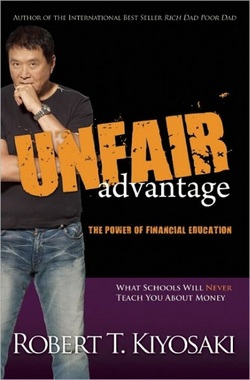
This new release from Robert Kiyosaki was one of his best yet. He has been known to provide timely information in his books to help people understand what is truly happening in the economy at that moment and the bigger picture of what is to come. This book goes into a little more detail than many previous books. He gives specific examples of some of the investments he makes and then goes over the principles he follows that led him to make those investments. The first part of the book is a lot of review from his best-selling books Rich Dad, Poor Dad and The Cashflow Quadrant but it is good review. Here are some great nuggets that I was able to get out of the book:
Education:
· Schools change to slowly and the world is changing rapidly.
· There needs to be three types of education: Academic, Professional, and Financial.
Financial Education:
· If a person knows the tax laws they will not have to pay unnecessary taxes.
· There are three types of legal income: Earned income, Portfolio income, and Passive income.
· The most important investment you make is first investing in your financial education before you invest in an asset.
· Investors must know the difference between investing for capital gains and investing for cashflow.
Having a Plan:
· First, sit down together with your spouse and make a list of the most important financial goals for both of you.
· Second, study and learn together what you need to do to achieve those goals.
· Third, go out together and apply what you learned to attain those goals.
Other:
· Residential real estate is only as valuable as the jobs in the area, so only invest where there are stable jobs.
· Real estate can give you benefits through depreciation, amortization, and through appreciation in value.
· The three objectives he has when investing are: Getting his money back out in one to three years, move his money to another investment, and have ownership and long-term cashflow from the initial investment. He goes into detail on how to achieve this all while paying little to no taxes. Because taxes are your single largest expense, figure out how to lower them legally.
· Risk is related to control. Less control means you take on more risk.
· Using debt to buy assets that generate positive cashflow can make you very wealthy, using debt to buy liabilities that do not make cashflow for you can make you very poor.
· There are four different asset classes: Business, Real Estate, Paper Assets, and Commodities.
· Use assets to buy liabilities. Rather than live below our means, we should expand our means by focusing on the asset column as a balance sheet.
· Today all money is debt and is rapidly being devalued with more national debt.
· Investors do not park their money anymore, they move their money, and this is called the “Velocity of money”.
I highly recommend this book to everyone that is interested in how to survive and thrive financially in the future. If you have read this book also leave a comment on what you thought of it.
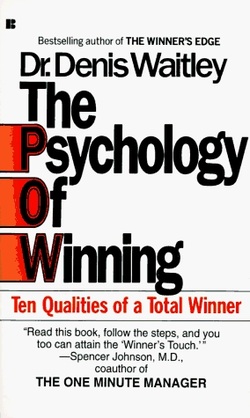 This book was an interesting read. Throughout many parts of the book I rolled my eyes or thought of certain pages as fluff. In spite of this, I still did pick up a few good nuggets. Here are some of the things I thought would be worth sharing.
1. The importance of a holistic approach to self-improvement: Physical, Mental, Spiritual, Relational
2. Take time every day to be by yourself. Reflect on the day past to see what could be improved on, focus on the present and prioritize the tasks before you, and game plan and set goals for your future.
3. When someone pays you a sincere compliment simply say “Thank you”, don’t belittle yourself if you feel uncomfortable and don’t blab how great you are either.
4. Don’t compare yourself with others. Compare yourself with who you are in the present versus who you want to be in the future. Then figure out a way to grow to become that person.
5. When winning individuals encounter fear, they admit it and go on despite of it.
6. Scientists agree that the human nervous system cannot tell the difference between an actual experience and an experience imagined vividly, emotionally and in detail.
Chapter 7 is a good chapter to read for anyone that wants more details on goal setting. Also there is a good section about how our subconscious minds work, and how to use that in a way to grow yourself. This is not a book that I would say is a must read, although, I hope the nuggets that I did end up getting out of it will help you.
-Paul W.
|




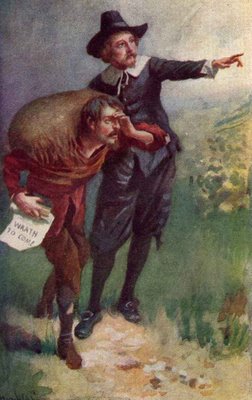


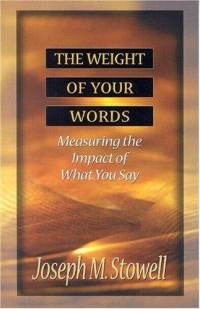



 RSS Feed
RSS Feed